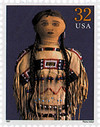
# 3151g - 1997 32c Classic American Dolls: Plains Indian
US #3151g
1997 Plains Indian – Classic American Dolls
- Pictures the Plains Indian doll complete with tanned leather clothing with beadwork accents.
- Part of the Classic American Dolls set – the first time photographs were used instead of paintings or drawings for a large US set with different stamp designs
Stamp Category: Commemorative
Set: Classic American Dolls
Value: 32¢, First Class Mail Rate
First Day of Issue: July 28, 1997
First Day City: Anaheim, California
Quantity Issued: 105,000,000
Printed by: Printed for Ashton Potter (USA) Ltd. by Sterling Sommer of Tonawanda, New York
Printing Method: Offset
Format: Panes of 15 (Vertical, 5 across, 3 down)
Perforations: 10.9 by 11.1
Tagging: Large tagging block over all 20 stamps, covering the stamps to the edges
Why the stamp was issued: To commemorate the Plains Indian doll produced in the 1920s. It included Native American-tanned leather and beadwork.
About the stamp design: The stamp pictures a photograph of the doll against a blue paper background.
First Day City: The First Day of Issue Ceremony was held during the annual membership meeting of the United Federation of Doll Clubs at the Anaheim Hilton and Towers Hotel in Anaheim, California.
About the Classic American Dolls set: The USPS issued the stamps to commemorate American dolls that “reflect the tradition, heritage, culture, and artistic style from various geographical regions of this country.”
Each stamp design pictures a photograph by Sally Andersen-Bruce. Each doll or pair of dolls is shown in front of a blue paper background, tying the stamp designs together. The names of each doll are printed in small type below the bottom frameline of each stamp, across from the 1997 year date. They’re also listed in the horizontal selvage at the bottom of the pane of 15.
The set marked the first time photographs were used instead of paintings or drawings for a large US set with different stamp designs.
History the stamp represents: Victor Hugo, the 19th-century French writer, once remarked, “In the same way birds make a nest of anyting, children make a doll of no matter what.” Such is true of the dolls crafted by the early Native American tribes. The first dolls made by the Sioux and other Plains Indians began as simple shapes cut from rawhide and stuffed with buffalo fur.
The doll’s dress was made from tanned deerskin and decorated with glass beads to resemble those worn by that tribe. Occasionally, a child might attach some of her own long hair to the doll. Through time, as traded goods such as beads, fabric, and other sewing notions became available, the dolls grew more elaborate. Sewn with painstaking detail, these playthings also helped a young girl learn how to make household objects. During the late 1800s, Plains Indians began making the beaded buckskin dolls to sell to tourists. Usually purchased as toys for non-Indian children, these souvenirs eventually became collector’s items.
US #3151g
1997 Plains Indian – Classic American Dolls
- Pictures the Plains Indian doll complete with tanned leather clothing with beadwork accents.
- Part of the Classic American Dolls set – the first time photographs were used instead of paintings or drawings for a large US set with different stamp designs
Stamp Category: Commemorative
Set: Classic American Dolls
Value: 32¢, First Class Mail Rate
First Day of Issue: July 28, 1997
First Day City: Anaheim, California
Quantity Issued: 105,000,000
Printed by: Printed for Ashton Potter (USA) Ltd. by Sterling Sommer of Tonawanda, New York
Printing Method: Offset
Format: Panes of 15 (Vertical, 5 across, 3 down)
Perforations: 10.9 by 11.1
Tagging: Large tagging block over all 20 stamps, covering the stamps to the edges
Why the stamp was issued: To commemorate the Plains Indian doll produced in the 1920s. It included Native American-tanned leather and beadwork.
About the stamp design: The stamp pictures a photograph of the doll against a blue paper background.
First Day City: The First Day of Issue Ceremony was held during the annual membership meeting of the United Federation of Doll Clubs at the Anaheim Hilton and Towers Hotel in Anaheim, California.
About the Classic American Dolls set: The USPS issued the stamps to commemorate American dolls that “reflect the tradition, heritage, culture, and artistic style from various geographical regions of this country.”
Each stamp design pictures a photograph by Sally Andersen-Bruce. Each doll or pair of dolls is shown in front of a blue paper background, tying the stamp designs together. The names of each doll are printed in small type below the bottom frameline of each stamp, across from the 1997 year date. They’re also listed in the horizontal selvage at the bottom of the pane of 15.
The set marked the first time photographs were used instead of paintings or drawings for a large US set with different stamp designs.
History the stamp represents: Victor Hugo, the 19th-century French writer, once remarked, “In the same way birds make a nest of anyting, children make a doll of no matter what.” Such is true of the dolls crafted by the early Native American tribes. The first dolls made by the Sioux and other Plains Indians began as simple shapes cut from rawhide and stuffed with buffalo fur.
The doll’s dress was made from tanned deerskin and decorated with glass beads to resemble those worn by that tribe. Occasionally, a child might attach some of her own long hair to the doll. Through time, as traded goods such as beads, fabric, and other sewing notions became available, the dolls grew more elaborate. Sewn with painstaking detail, these playthings also helped a young girl learn how to make household objects. During the late 1800s, Plains Indians began making the beaded buckskin dolls to sell to tourists. Usually purchased as toys for non-Indian children, these souvenirs eventually became collector’s items.









